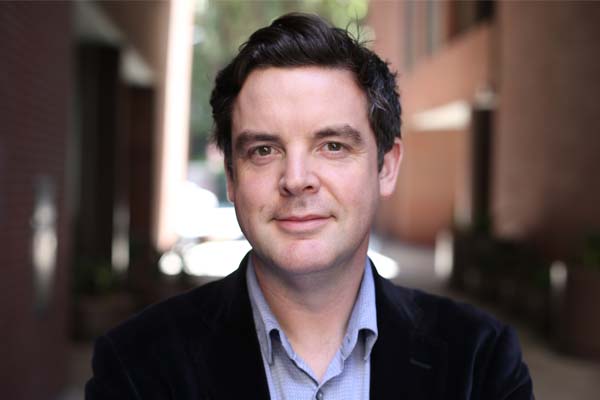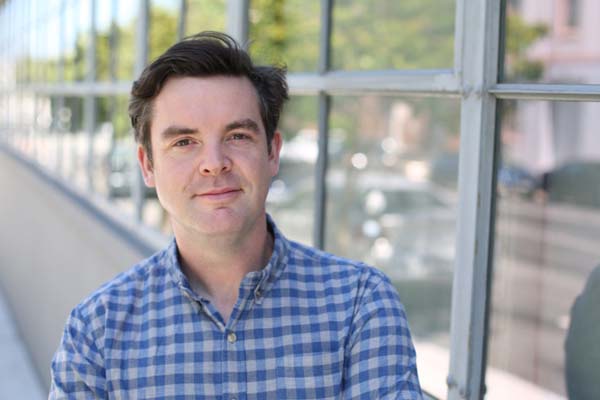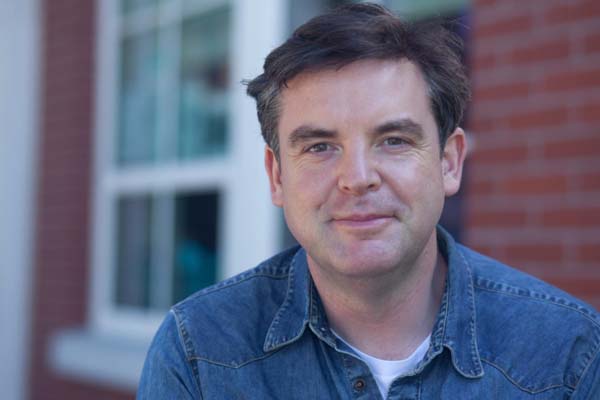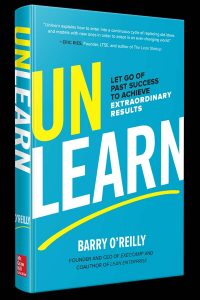
How do you innovate at scale? The answer lies outside of your comfort zone. Humans are creatures of habit. We like routines because they help us feel in control and safe. But what happens when the things that once helped us become successful no longer work? That is what today’s guest, Barry O’Reilly, talks about. Barry is an entrepreneur, business advisor and author who has pioneered the intersection of business model innovation, product development, organizational design, and culture transformation. Barry is the co-founder of Nobody Studios and the author of two international bestsellers, Unlearn and Lean Enterprise. In this episode, Barry speaks about how unlearning what made you successful in the past helps you achieve extraordinary results in the future. Though this may sound counterintuitive, it is essential for growth. Comfort is the enemy of progress. And to truly achieve something great, you must be willing to leave your comfort zone and embrace change.
—
Listen to the podcast here

How To Innovate At Scale With Barry O’Reilly
Thank you for visiting me, for sharing, for commenting on LinkedIn, and for emailing me at Ben@YourBrandMarketing.com. I love the fact that you have been with me, and I appreciate everything that you do and be part of the community. Thank you for coming back.
On this episode, I’ve got Barry O’Reilly. We are going to talk about Unlearn: Let Go of Past Success to Achieve Extraordinary Results. That is the name of his book. I met Barry when I had Bryce Hoffman on my show. He says, “You got to listen to a couple of my previous episodes,” and the first episode I listened to was Barry. Barry, welcome to the show.
It’s a pleasure to be here, Ben, and no better introduction via Bryce’s show. It’s a great show.
I’m a podcast addict. I love listening to different podcasters because I always learn something different. Different intonation, different types of questions, pacing, and different ways of thinking about things, so the more different podcasts I can listen to, the more I’m exposed to different ideas, and I love that.
It’s a great philosophy. I look at my phone, and I’ve got 25 different shows that I love to follow and might get listened to all the episodes. It’s such an interesting way to learn not only how to do your own show but learn in general. There’s so much great knowledge that people are sharing. There’s a certain intimacy as well and a focus on listening to podcasts. I imagine that many of the readers are running on a treadmill or walking in a park with their dogs. Who knows? For me, it’s a very important part of my growth process, and delighted to share, hopefully, some nuggets with your audience and spend some time with you too.
I’m excited about the conversation. The thing that got me excited with your concept of Unlearn. I’m going to let you explain it because you are going to do a far better job about this than I will. Basically, what got us to this point may not necessarily move us forward. Why don’t you give us a little bit of history of who is Barry? What brought you to this point, and then let’s get into the whole Unlearn concept?
I’m a total mind grow. I did lots of different things over the course of my career. I started off as a software engineer. I worked for a company called CitySearch.com in the late ‘90s. That was a company that was born out of the idea lab at Bill Gross’ venture studio. The idea is that we put people on the internet back in ‘99.
We would go around to like a supermarket, and a restaurant, take some photos of the restaurant and put the menu on the international. They would have a URL for $50 a month called BenBakersRestaurant.CitySearch.com, and people could be on the internet. It was an amazing thing for them. Our number one competitor was Zepto. Are you familiar with Zepto?
Yes, absolutely.

What reminded you of them? How did you know them?
I came through the high-tech world in the ‘80s and the ‘90s. In 1987, I was writing the mainframe at the University of Victoria and built the first Mac Lab. I started in the technology game very early on. In 1984, we had the first Mac SE in Western Canada. I remember pouring over the PC magazines. What was next? Who was doing what? What was going on? I was one of those kids that were always looking to say, “This is going somewhere.” I have no idea where it’s going to go. I started in the days of LISTSERV and learning about training cobalt. Where you are coming from was the next logical step. For me, it was exciting.
We were building CitySearch, and Zepto was Elon Musk’s first company. We were battling it out for taking on this online directory. We were going to merge at one point but it didn’t work out. I often joke that I didn’t know what happened to Elon but here I am on your show.
We will get him on the next episode. I’m sure it’s a phone call we can make. No problem.
That gave me my star. What was fascinating to me was when you had this nexus of customer need and technology to solve problems in interesting ways. The ability to iterate, learn new skills, and then unlearn things that I thought were correct but were not working. Even as we tried to grow that business and subsequent businesses that I was in, I constantly kept coming up against this pattern that it’s not necessarily learning new things is tough but what’s even harder is getting people to unlearn their existing behavior.
Especially if it had made them successful in the past, you see this a lot in startups where initially the thing that makes a startup successful going from 0 to 1 is not the thing that makes it successful going from 1 to 3 and 3 to 5 and 5 to 15. You are constantly on this journey of evolution about adapting to changing circumstances and new markets that you operate in. That’s true of your product but it’s also true for people.
The leadership required to bring a company from 0 to 1 is very different than the leadership required to bring it from 5 to 50. These are some of the things that you start thinking about. What I kept seeing again and again, and I’ve worked with some phenomenal leaders. There are case studies in the book from Capital One, American Airlines, British Airways, Wells Fargo, Spotify, and Slack, all these phenomenal companies and phenomenal leaders.
I kept coming up against this pattern that learning new things were tough. What was even harder was getting people to let go of their existing behavior and thinking because it had brought them success to date. That necessarily wasn’t going to be the thing that guaranteed them success in the future. How could they recognize those limiting beliefs and behaviors and essentially unlearn?
It’s fascinating when you think about that because as an entrepreneur, as you are starting a company, you become successful. If you become successful, you become successful. You say, “If these policies, these procedures, it’s this way of thinking, dealing with the customer, dealing with vendors, marketing, branding, all of this has made me successful.” You reached a point where you hit this glass ceiling, and you have no idea why you can’t move any further.
Learning is a process of letting go or reframing and moving away from once useful mindsets and acquired behaviors that were effective in the past but now limit our success. Share on XThat’s a frustration point for more entrepreneurs that I know of because they constantly sit there and go, “Why isn’t this working anymore? Why is everything that’s made me successful, everything was worked up to this point in time, as I’m trying to get bigger, as I’m trying to go from 100 to 500 people or 50 million to 100 million, why is this not working the way it did when I was the $30 million company?” That’s got to lead to a lot of frustration for a lot of CEOs and leaders.
It’s a feedback mechanism. This is the point. It’s an obstacle that you are not being able to get past. With all the behaviors that you’ve used that have brought you to the success that you are experiencing are not going to be the thing that helps you pass through the challenge that you are trying to get to the next level. It’s funny. Even when I talk to people about unlearning, a lot of the time, they get very agitated or almost defensive about it.
They are like, “What are you saying? Everything that I know is wrong?” Nothing could be further from the truth. The way I describe unlearning is it’s a process of letting go or reframing and moving away from once useful mindsets and acquired behaviors that were effective in the past but now limit our success. It’s not forgetting, removing or discarding your knowledge or experience. It’s the conscious act of letting go of outdated information and actively engaging in taking in new information to inform your decision-making and action.
When you start to think of it more like a system where you are able to diagnose when your current behavior or thinking is limiting your success and reframing the outcome that you are aiming for, relearning new behaviors to try and get you to this next level or outcome that you want to achieve, that in itself is a huge breakthrough.
People are encouraged to experiment to try new uncomfortable behaviors that they might not be familiar with. What could be the answer to get them to break through that they are looking for? What I’ve constantly learned is unlearning is not like a one-and-done process. It’s a system. It’s continuous. When you learn to unlearn one problem, then you suddenly have a system to start tackling numerous problems. That’s where it starts to get fascinating and interesting.
Let’s address the elephant in the room, and that’s fear. People are afraid of change. People are terrified of the unknown. People are scared of the dark. People are scared of what’s around the corner. People are scared of making that one mistake that is going to take them from being a successful business to a hugely unsuccessful business. It all comes down to risk and not understanding what they don’t understand.
How do we get people who have become very comfortable with either a lifestyle, a style of business, a methodology or a set of processes to be able to sit there and say, “If I want to get to the next level, I need to be able to give up control or I need to be able to give up the thought process and build a new set of systems or think slightly differently to be able to move me over that hump?” How do we address that fear, uncertainty, and comfortableness that people have that keep them from moving forward and wanting to move forward?
There are a number of characteristics that I talk a lot about that people have to develop to be successful as they unlearn. The first one is curiosity. If you are not open to taking in new information that goes against your existing thinking, you are going to struggle. It’s funny. If I ask people, “Are you curious?” Very rarely do I have anyone say no. Everyone thinks they are curious but then I give people examples like, “What happens if you are working with someone more junior than you and you give them a problem to solve, and they start solving it in a different way that you would do it? What’s your initial reaction?”
Most people smiled and laughed and go, “They are doing it wrong.” I’m like, “Yes.” That’s a good example of you shutting yourself down from new ways of working. One of my favorite people to work with is a guy called Joe Norena. He was the COO of HSBC Global Markets. What Joe would do was sit down with the graduates every year when they came into the company. He would give them problems to work on that he was working on to see how they would solve them.

By immersing himself with these people who are thinking in a different way, new tools, and new technologies, he would learn all these new skills. You imagine the cultural artifact that creates in a hierarchical company like HSBC, where you’ve got some of the most senior people sitting with the most junior people and learning or unlearning from them. It’s fascinating. The next one is commitment.
That’s the ability for people to commit to doing things that they are not going to be good at. Often the thing that’s going to give us a breakthrough is a new behavior. We would like to stick to the behaviors that we know. To your point, we avoid risk. That’s our natural inclination but the commitment part is you’ve got to commit to trying things that you are not going to be good at and deliberately practiced them to try and get better and take on more difficult tasks. That’s when you start getting into this realm then of understanding comfort or comfortable with being uncomfortable because all growth happens outside your comfort zone.
If you are not progressively practicing getting outside your comfort zone and trying things that are new that you are not good at and struggling and finding a way to improve. That is a muscle that you need to be working on. The way you develop that muscle is you create safety to succeed. We talk a lot in the book about this idea of thinking big but starting small. You can learn fast what works for you or not.
Thinking big is important because you need to have big, bold aspirations to break free of your existing behavior but you don’t think big and start big. You think big and start small. The power of starting small is it creates safety. There’s psychological safety. If you make small errors or mistakes in front of your peers, they are recoverable. You can talk to people to say, “I’m trying something new here. Probably going to suck at us. Let’s see what happens.”
It also gives you that sense of accomplishment. Having those small successes gives you the impetus to try different things as well.
This is the power of small. It creates fast feedback loops so you can learn fast what works and what doesn’t. If it’s working, you can celebrate the success. If it’s not, you don’t need to beat yourself up too much about the failure and see it as a feedback mechanism to say, “That didn’t work. What’s the next thing I’m going to try?”
Get into that habit of trying things. That’s why this notion of thinking big, start small, learn fast is a real mantra of what unlearning is about and a system to explore uncertainty and risks in a controlled manner. I can’t tell you how many people send me messages and go, “Think big and start small.” They love it. It’s a way for us to start tackling these things and learning to unlearn.
It’s the curiosity factor. To be able to sit there and go, “This is how I would solve it but let’s see how other people would.” There’s a woman that I knew by the name of Nancy Richardson. She was with Lululemon at the time. I don’t know where Nancy is now. Her thing was she wanted to give people safe space to fail.
Her job was to give people behind her who were part of our team safe space to fail. She says, “I will protect you. Take this on. Try this initiative. Here are some things that you can do on your own. Figure it out. Let’s learn from it.” She celebrated both the successes and the failures equally. It was an amazing thing to be able to watch the people that were part of her teams grow because they had the permission to fail, try, and be curious. I love that whole philosophy.
Unlearning is not like a one-and-done process. It's a system and it's continuous. Share on XThe thing that often catches people out is that failure and success are just feedback. Success is you moved in direction you hoped. Failure is you didn’t go in the direction you hoped. If you can start to devolve yourself away from beating yourself up or feeling your identity has been destroyed because something you tried didn’t work out, you need to start thinking of it more of a process.
It’s a learning process of attempting things to see, “Are we moving into the desired direction of the outcome we are aiming for or are we moving away from it?” Both are signals. That’s one of the things that helped me a lot because I’ve started a bunch of businesses. I’m building a venture studio where we are trying to build a hundred companies over the next five years at Nobody Studios. We are going to get a lot of things wrong.
We want to get things wrong as quickly and cheaply and as fast as possible so we can get back onto the right path of where we want to go. That’s what entrepreneurialism is. It’s taking risks. It’s a life of risk and managing risk and trying to start to understand, “Can we solve the problems we want to solve?” I would encourage your readers. Failing sucks. Don’t get me wrong, I hate it. It drives me nuts. It’s painful. It hurts my identity.
It can be expensive.
That’s why starting small is so important because it allows you to explore uncertainty in a controlled manner. Small steps to give you confidence that you are moving in the right direction or the wrong direction and adapting. That’s important. Especially as you try to grow your own personal skills or encapsulate certain products that you are trying to build.
How do we grow leaders that are comfortable enough with their own abilities to unlearn and teach others how to unlearn? A lot of this comes down to, “If you are comfortable in your own skin, with the fact that if I fail, and if I don’t succeed, it’s not the end of the world. It’s a learning experience. By my team failing, they are not failing. All they are doing is finding something that didn’t work so we can move quicker towards something that is going to.” That’s a skill.
That’s a very deliberate skill that a lot of people don’t have. A lot of people point fingers, lay blame, send out pink slips, raise their voices, and do all sorts of things other than sit there and say, “Let’s look at a different way of doing this. Let’s learn from the experience and be able to move on and be able to unlearn so you can relearn.” How do we build leaders and cultures to be able to allow that to happen? It doesn’t happen everywhere.
The first step is designing those experiences or opportunities. One of the most important things, and I do this in Nobody Studios all the time. There are a bunch of people joining the studio, giving them opportunities. Maybe it’s first-time entrepreneurs, first-time founders, first-time, everything. Even the studio is the first-time thing that we’ve ever done. A lot of it is a learning process. I find that a lot of my role as the Chief Incubation Officer there is to create controlled experiments for people to try new things and learn new behaviors. I will give you a simple example.
We were doing portfolio reporting. Looking across all the different companies in the portfolio, finding out a great way to report progress on how each one of them is doing and create a portfolio report, so anybody who’s part of the studio is able to see every single company that we are working on and even dive in to look at each individual company and look at it. How do you write reports that people will understand, meaningful, and successful? We have a few ideas about what those reports could look like.

We got the team together. We debated about what information we thought was the most interesting or the most important. What was common? That should be across all the different companies and maybe what’s unique. We came up with the prototype for what the report might be. It’s like, “Great. All right, let’s try it. Let’s ship this report and see what feedback we get.” Sure enough, people were nervous like, “Is this the right information? Is it too much? Is it too little?” We put it out into the world and got great feedback.
People were like, “I love this but it’s missing that. I love that report on how fast the team is going but what are they working on next? That’s an interesting growth model but what investments need to be made to get us there?” It started by allowing the team to start owning, creating those reports themselves, and then getting feedback on them. I’m like, “How are we going to make this better? We’ve done one rap, and it was a decent rap but how do we do the next rap and again?”
If we built this culture, this mechanism into encouraging people to like, “Make it good enough that you are willing to show it to people to get feedback. Get 80% good enough.” Understand that it’s never going to be perfect but understand it can get better and starts the process. Now we are already building this culture of learning into our company where everyone new has to write a simple report. It’s feeling comfortable to experiment.
Maybe put on a new thing in their report each week or something that’s a little bit different that might be topical but they are learning how to iterate, to try things, to get feedback, and they are encouraged to write. We believe, in the studio, that if we keep instilling that value into the way people work, whether it’s reporting, new features, talking to customers, that will help us be successful. That’s the mentality of how the team works, and it’s exciting.
It is exciting because, as you said, you created a report and knew it wasn’t perfect. You knew as it went out the door that it wasn’t perfect but you sat there and said, “At least it’s out the door. At least, here, go and break this. Tell me what you like about it. Tell me what you don’t like about it. Tell me how you can make it better.”
Fifteen people looking at this report are going to have fifteen different ideas about how to make it better. You may take all those ideas. You may take some of those ideas. You might take none of those ideas but all you are going to do is keep iterating and not being so scared of shipping something that isn’t perfect that nothing ever gets shipped.
The most important thing to your point before is that people aren’t afraid to try things. They feel like they have agency, and that, I believe, will encourage them to keep trying things. Keep making it better. Once we create that as a mechanism, we are going to be undefeatable because we have built a system to constantly iterate, test, and learn and figure out what is going to work and what’s better.
How do we get people to unlearn where there isn’t a culture of empowerment?
There’s a series of questions that I ask people to help them diagnose. The first question I always ask people is, “Can you think of a situation or area where you are not living up to the expectations you have for yourself? Maybe you are not achieving the results that you are aiming for. Maybe there’s a situation that you are struggling with or avoiding altogether, or maybe you’ve tried everything that you can think of, and you are still not getting a breakthrough?”
Failure and success are just feedback. Success is you move in the direction you hoped, and failure is you don't go in the direction you hope. Share on XNot living up to the outcomes you are aiming for. Not achieving your expectations of yourself, situations you are avoiding or struggling with, or trying everything that you can think of and not getting a breakthrough. Now, when I ask people those questions, it’s not a case of one thing popping up. It’s ten things that start popping up in their mind. Again, this is the feedback mechanism that tells you, “The reason I’m experiencing these obstacles is because my existing behavior is not working.” That’s why there’s this loggerhead.
That gives you a direction, “These are some of the obstacles I need to address.” When you can identify those obstacles or diagnosed them, then it’s about reframing the obstacle as the outcome that you are aiming for. Come up with ways that you can start to experiment with new behaviors to achieve that outcome. I will give you a simple example of myself, book writing. Book writing is one of those things that I certainly was like, “Wow. Imagine one day I wrote a book. That would be a nice accomplishment in life.”
It was daunting the first time, wasn’t it? It was extremely daunting.
It continues to be but I had a solid history of D minus in English Literature. I’m dyslexic. I still believe if my English teacher knew that I’d written one book, they wouldn’t even believe it. For me, I was like, “That’s something that other people would do because I will never be to do that.” It was funny then. One of these things and it got me thinking when I did say, “I’ve got to try and write a book. This is a challenging I’m going to set myself.” I started replicating what I thought writers did. I always had this vision of sitting in a purple velvet jacket by a roaring fire with red wine and writers like Hemingway turning out these pages. That’s what I tried to do. I stopped by a lot of fires, drank a lot of wine, and tried to write. It didn’t work out so well for me.
Hopefully, a good wine at least.
That’s what always made me feel better, at least. I was doing these behaviors that I thought were the way that you write and having no success. I was failing in a way. It’s like, “I’m not meant to ever be a writer,” but then I started to think about, “This is not working for me, this behavior of typing. To try and create a book is not working for me.” That’s my obstacle but what is the outcome I want?
It got me thinking about, “A book is content, and there are many ways to create content.” Writing is one behavior to create content. The easiest way or more natural way for me to create content is not typing. It’s talking. What I did was I got a journalist to start interviewing me. What we would do is I would bullet out the points that I want to make in the chapter. The journalists would interview me, and we would record the interview and transcribe it using an automation service fast.
After an interview, we would have 10,000, 15,000 words transcribed in minutes. The journalist would edit it as a journalist would edit content and ship me this MVP or this minimum viable chapter, literally within 2 or 3 hours, then I had something to react to and start going, “That’s not what I meant to say there or this is missing here.” I was iterating fast. That’s how I wrote if I even wrote a book, Unlearn. I talked at all.
That was a great example of this unlearning that I thought you have to type to write but for me, it was about talking and then editing. The result of that is this book that exists in the world, and it has been translated into numerous different languages and released in Chinese. It’s phenomenal but I didn’t type a word of it. I talked it all.

That’s phenomenal because I have a similar experience. My first book, I wrote it with a keyboard 2 hours in the morning, 2 hours at night for 45 days straight and typed. It was a stream of consciousness. I don’t think I even wrote notes. It was one of those streams of consciousness and then took me 8 or 9 months to edit it, to get it to the point where I was ready to put it out the door.
The second book I did was a series of episodes. My partner and I did sixteen interviews where we talked for an hour, each one. You are right. We took it. We put it into the transcription software. We edited it down. We tore out sections. We added sections but you had that back and forth piece, and it was written completely differently. Both of them are quite good for what they are. They are great books. They are insightful and thought-provoking, and I’m proud of both of them. They are written completely differently.
It’s brought me to thinking about where my thought process is. We need not to be limited to think that, “I’ve always got to do this way. There’s only one way of doing anything because I don’t believe that’s true.” How do we move people beyond the thought to sit there and go, “There is another way to tackle this problem?” How do we get people to believe that they are allowed to experiment and try that they are given permission to do something in ways that nobody else has done, and it doesn’t make it wrong? It means let’s try it a different way.
Your story is a testament to that. That’s part of the fun, figuring it out like, “What’s the answer? How does the equation balance? Is this the right equation to write? Should I come up with a new hypothesis?” What’s fun, for me, anyway, about life, growth, and experimentation is trying all these different things because you never know what’s going to work. If you go with that curiosity in a way, you are going to have moments where you fall flat on your face and think you are a failure.
Why did you bother doing all this? It was a big waste of time. You are going to have moments where you write a book because you talk to people back and forth and it’s out there in the world. It blows your mind of how that was achieved in not the way I thought it would happen. There’s something fascinating about that.
I want to be wary of our time because we are coming to an end here. Is there one thing that you want to emphasize about and learning that we haven’t talked about? Is there one thing that you sit there and say, “There’s an a-ha moment,” that is going to give people some insights that we haven’t discussed yet?
The encouragement I would give people is it’s not that hard to start. One of the little tools that one of my coaches, Sabrina Braham, gave to me was like, “Even if you figure out how to unlearn, try this.” Go and find somebody that you trust. Someone that you know appears. Someone that you work with on a regular frequency. I want you to go and ask them and even tell them that you are trying to unlearn some behaviors that you think you need to unlearn and ask them, “Can they think of any behaviors or observe in you that you might want to unlearn?” They might be kind enough to give you a few examples.
Pick one of them that you agree with and you want to unlearn. Pick that, ask them, and maybe they say it’s giving feedback. On a scale of 1 to 10, ask them, “How good am I at this?” Hopefully, they are honest and kind and will tell you that you are a 4 out of 10. You are like, “Brilliant. Thank you. I’m a four. How do I get to four and a half in the next week? What are some things that I could try in the next week to go from 4 to 4 and a half?”
Hopefully, there will be kind enough to give you some ideas again. I want you to pick one of them that feels slightly uncomfortable. Not totally out of, just slightly uncomfortable and practice it for a week. At the end of that week, go back to that friend, that peer, whoever it may be, and say to them, “I have been trying to unlearn using the suggestions you’ve made. On a scale of 1 to 10, where do you think I am now?” Maybe they might go, “You are a six.” You are like, “Brilliant. How can I get half a point better next week? Do you have any other?” If you get into that habit of constantly experimenting and trying things, you will be amazed by the results.

Small incremental changes, small wins, small losses, evaluate change and move forward. Barry, what’s the best way for people to get in touch with you?
I’m available on all good internet stores at BarryOreilly.com. You can find me pretty much on most social media accounts with that handle. If you are interested in what we are building at Nobody Studios, please check us out at NobodyStudios.com. We are about to launch an equity crowdfunding. It’s the first ever venture studio ever to let retail investors or people in the high street be able to own a piece of the venture studio.
If you are interested in what we are building, check us out, and if you are even more interested, you are welcome to come and invest with us. I’m very excited about the future. The world is changing very fast. Interesting things ahead, and I’m looking forward to helping people build them. Thanks for having me on the show, Ben, and I look forward to staying in touch with you and your audience and seeing how I can help.
One last question I always ask before I let you out the door, and this is it. As you leave a meeting, you get in your car and drive away, what’s the one thing you want people to think about you when you are not in the room?
It’s funny. One of the things that I want them to think less about me but more about the moment is, “How can we make it better next time? What’s one little thing that we can introduce into that interaction to make it better next time?” For me, that’s the premise that I love people to be left with and thinking about. It’s not like, “What about Barry?” The interactions we have, how can we make it a little bit better next time?
When everyone is thinking like that, the quality and the performance goes open up and up. Every time we have a meeting at Nobody, I’m always thinking or even trying to suggest to folks, “What’s one thing we can do next time to make this better?” If we get into that habit and the sky’s the limit, think about where we can get to. That’s my answer.
Let’s all get a little bit better every single day. It will be critical. Get a little uncomfortable, and let’s unlearn. Barry, thank you for being such an amazing guest.
It’s my pleasure, Ben. Thanks for having me.

Important Links
- Ben@YourBrandMarketing.com
- LinkedIn – Ben Baker
- Unlearn: Let Go of Past Success to Achieve Extraordinary Results
- Bryce Hoffman – Past Episode
- CitySearch.com
- Zepto
- HSBC Global Markets
- Nobody Studios
- BarryOreilly.com
- Twitter – Barry O’Reilly
- ExecCamp
About Barry O’Reilly
 Barry O’Reilly is an entrepreneur, business advisor and author who has pioneered the intersection of business model innovation, product development, organizational design, and culture transformation.
Barry O’Reilly is an entrepreneur, business advisor and author who has pioneered the intersection of business model innovation, product development, organizational design, and culture transformation.